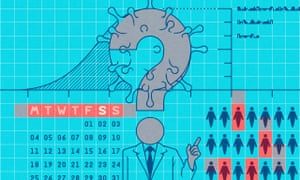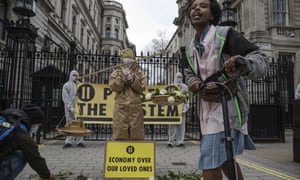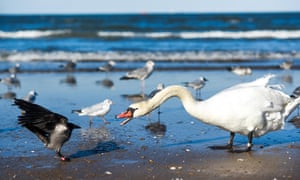
Illustration: Matt Kenyon
Sometimes you’re just asking the wrong question. On news programmes and at daily briefings, politicians across the world face versions of the same query again and again: when will the lockdown end? But that’s the wrong question.
Imagine a family has escaped a rampaging bear in the woods, seeking refuge in a log cabin. After sheltering there for days and weeks, they’re desperate to know when they can come out. But they wouldn’t simply be asking “When?” They would be asking “When will it be safe?” which is a different and tougher question, one whose answer would depend on several other questions: has the bear been tamed? If it hasn’t, do we have the weapons to destroy it or at least protect ourselves against it? And are those protections strong enough that we won’t have to rush back inside the cabin the moment we’ve ventured out?
We should be clear on one thing. Impatience to see an end to this mass, global quarantine is understandable. It’s not just boredom or lack of stamina that prompts it. There are people struggling to put food on the table; there are people whose mental health is faltering; there are people for whom a day stuck at home is a day stuck with a domestic abuser. For them lockdown is a jail sentence and they need it to end.
So of course it makes sense to long for an exit strategy. But it has to begin with an understanding of what lockdown is and what it is not. It’s tempting to see it as a solution: everyone stays at home, we “flatten the curve” and then, slowly and gradually, we lift the restrictions and return to normal. But that’s not how it is. Instead, lockdown is merely the crudest, bluntest instrument we could reach for when the coronavirus first struck. Its primary objective was to keep the number of people infected sufficiently low that the health service could cope. Judged by that standard, preventing, say, the NHS in Britain being overwhelmed, it has succeeded.
But essential though it was and is, lockdown could only ever be a first step. It enjoys remarkable support – still backed by 91% of Britons, according to a YouGov poll – but it was always going to be dropped the moment a better option became available. The ideal would be a vaccine, equivalent to removing the bear’s claws and teeth, but that, we are warned, is 18 months away at best. So what’s the other route out of hiding?
Read the expert plans, and they all come back to one thing. Sure, social distancing will have to endure, in one form or other, but the key will be the one identified by the World Health Organization at the start: testing, testing, testing.
And yet here, too, there is a misconception, and it is one of scale. So far, testing has been limited to those with symptoms and in hospital. But the Nobel laureate Paul Romer – admittedly his prize was for economics rather than epidemiology – has got a lot of attention for a plan that argues that for the economy, and human life, to return to anything like normality, testing will need to be conducted for millions of people, all the time. He imagines health workers being tested at the start of a shift; the same would go for care workers, pharmacists, police officers and bus drivers. You might add teachers and restaurant workers. Romer wouldn’t bother testing people who already have symptoms: they should be presumed positive and immediately self-isolate. It’s the “asymptomatic spreaders” you need to identify, stopping them in their tracks. The logic underpinning the plan is clear: there will be no point in reopening shops, pubs and restaurants if people feel too scared to visit them. As virologist Prof Nicolas Locker puts it, “You can’t lift the lockdown as long as you are not testing massively.”
Do the maths and the numbers are colossal: Romer estimates some 22m tests would be necessary every day in the US alone, the equivalent of testing every American once every two weeks. Consider that there’s still no sign that Matt Hancock will reach his goal of 100,000 tests a day in the UK, and you realise how many orders of magnitude stand between where we are now and where we would need to be.
The obstacles are huge and obvious, though Romer reckons he has answers for all of them. Shortage of swabs? Move to saliva tests instead. Shortage of the key chemicals known as “reagents”? The test kits that rely on them are not the only option. The sheer numbers of tests that would have to be produced? The world’s manufacturers could do it; it just requires the political will. Which, given that our lives depend on it, should be there.
If that seems daunting, there is another approach. It would still require testing – though not on the same scale – followed by contact tracing: finding all those who’d been in close proximity to someone who’d tested positive and isolating them. “Test, trace, isolate” also has logic on its side, but it, too, takes lots of money and people. It’s thought one contact-tracer is required for every four cases of infection.
That means using the hiatus of lockdown to recruit and train people now in the mechanics of contact tracing. With no leadership from the top – on Thursday Donald Trump effectively announced that the buck stops with the 50 states – the likes of Massachusetts are already assembling their own squads of contact-tracers. San Francisco is doing the same, deploying a combination of librarians and medical students. The UK government could follow their lead immediately, putting to work some of the thousands of people currently at home and itching to help. Tech can play a role, too: note this week’s announcement that Apple and Google will join forces to see if they can produce the app that will make tracing easier and faster, though the threat to privacy of such surveillance is obvious.
What specific methods are deployed matter less than the bigger shift that is required, which is one of imagination. Governments need to realise that what’s coming is not a decision about easing this or that rule of social distancing, but rather a massive political, industrial and collective drive unseen since the last war. It may well mean repurposing factories to mass-produce testing kits. At the very least, it should mean a dedicated cabinet minister for testing.
This demands a huge shift by the UK government, which wasn’t even testing people coming out of hospital and going into social care until this week. But nothing less will be enough. It’s not enough to flatten the curve; we have to get ahead of it. It’s true that we cannot stay in lockdown for ever. But we cannot leave until it’s safe – and that requires a monumental effort, starting right now.
Sometimes you’re just asking the wrong question. On news programmes and at daily briefings, politicians across the world face versions of the same query again and again: when will the lockdown end? But that’s the wrong question.
Imagine a family has escaped a rampaging bear in the woods, seeking refuge in a log cabin. After sheltering there for days and weeks, they’re desperate to know when they can come out. But they wouldn’t simply be asking “When?” They would be asking “When will it be safe?” which is a different and tougher question, one whose answer would depend on several other questions: has the bear been tamed? If it hasn’t, do we have the weapons to destroy it or at least protect ourselves against it? And are those protections strong enough that we won’t have to rush back inside the cabin the moment we’ve ventured out?
We should be clear on one thing. Impatience to see an end to this mass, global quarantine is understandable. It’s not just boredom or lack of stamina that prompts it. There are people struggling to put food on the table; there are people whose mental health is faltering; there are people for whom a day stuck at home is a day stuck with a domestic abuser. For them lockdown is a jail sentence and they need it to end.
So of course it makes sense to long for an exit strategy. But it has to begin with an understanding of what lockdown is and what it is not. It’s tempting to see it as a solution: everyone stays at home, we “flatten the curve” and then, slowly and gradually, we lift the restrictions and return to normal. But that’s not how it is. Instead, lockdown is merely the crudest, bluntest instrument we could reach for when the coronavirus first struck. Its primary objective was to keep the number of people infected sufficiently low that the health service could cope. Judged by that standard, preventing, say, the NHS in Britain being overwhelmed, it has succeeded.
But essential though it was and is, lockdown could only ever be a first step. It enjoys remarkable support – still backed by 91% of Britons, according to a YouGov poll – but it was always going to be dropped the moment a better option became available. The ideal would be a vaccine, equivalent to removing the bear’s claws and teeth, but that, we are warned, is 18 months away at best. So what’s the other route out of hiding?
Read the expert plans, and they all come back to one thing. Sure, social distancing will have to endure, in one form or other, but the key will be the one identified by the World Health Organization at the start: testing, testing, testing.
And yet here, too, there is a misconception, and it is one of scale. So far, testing has been limited to those with symptoms and in hospital. But the Nobel laureate Paul Romer – admittedly his prize was for economics rather than epidemiology – has got a lot of attention for a plan that argues that for the economy, and human life, to return to anything like normality, testing will need to be conducted for millions of people, all the time. He imagines health workers being tested at the start of a shift; the same would go for care workers, pharmacists, police officers and bus drivers. You might add teachers and restaurant workers. Romer wouldn’t bother testing people who already have symptoms: they should be presumed positive and immediately self-isolate. It’s the “asymptomatic spreaders” you need to identify, stopping them in their tracks. The logic underpinning the plan is clear: there will be no point in reopening shops, pubs and restaurants if people feel too scared to visit them. As virologist Prof Nicolas Locker puts it, “You can’t lift the lockdown as long as you are not testing massively.”
Do the maths and the numbers are colossal: Romer estimates some 22m tests would be necessary every day in the US alone, the equivalent of testing every American once every two weeks. Consider that there’s still no sign that Matt Hancock will reach his goal of 100,000 tests a day in the UK, and you realise how many orders of magnitude stand between where we are now and where we would need to be.
The obstacles are huge and obvious, though Romer reckons he has answers for all of them. Shortage of swabs? Move to saliva tests instead. Shortage of the key chemicals known as “reagents”? The test kits that rely on them are not the only option. The sheer numbers of tests that would have to be produced? The world’s manufacturers could do it; it just requires the political will. Which, given that our lives depend on it, should be there.
If that seems daunting, there is another approach. It would still require testing – though not on the same scale – followed by contact tracing: finding all those who’d been in close proximity to someone who’d tested positive and isolating them. “Test, trace, isolate” also has logic on its side, but it, too, takes lots of money and people. It’s thought one contact-tracer is required for every four cases of infection.
That means using the hiatus of lockdown to recruit and train people now in the mechanics of contact tracing. With no leadership from the top – on Thursday Donald Trump effectively announced that the buck stops with the 50 states – the likes of Massachusetts are already assembling their own squads of contact-tracers. San Francisco is doing the same, deploying a combination of librarians and medical students. The UK government could follow their lead immediately, putting to work some of the thousands of people currently at home and itching to help. Tech can play a role, too: note this week’s announcement that Apple and Google will join forces to see if they can produce the app that will make tracing easier and faster, though the threat to privacy of such surveillance is obvious.
What specific methods are deployed matter less than the bigger shift that is required, which is one of imagination. Governments need to realise that what’s coming is not a decision about easing this or that rule of social distancing, but rather a massive political, industrial and collective drive unseen since the last war. It may well mean repurposing factories to mass-produce testing kits. At the very least, it should mean a dedicated cabinet minister for testing.
This demands a huge shift by the UK government, which wasn’t even testing people coming out of hospital and going into social care until this week. But nothing less will be enough. It’s not enough to flatten the curve; we have to get ahead of it. It’s true that we cannot stay in lockdown for ever. But we cannot leave until it’s safe – and that requires a monumental effort, starting right now.


